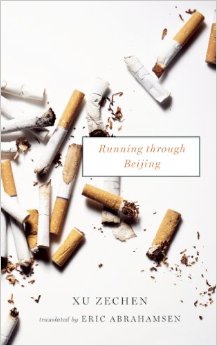Running Through Beijing
June 4, 2015 · 0 comments
By Jonathan Clements.
 Fresh out of prison after serving three months for a fake diploma scam, wide-boy Dunhuang falls in with the lonely, sex-starved Xiaorong, a girl who sells pirate DVDs. Unable to trace his old colleagues, off the radar among millions of illegal Beijing residents, he starts selling films on the streets, just another hustler trying to make a living.
Fresh out of prison after serving three months for a fake diploma scam, wide-boy Dunhuang falls in with the lonely, sex-starved Xiaorong, a girl who sells pirate DVDs. Unable to trace his old colleagues, off the radar among millions of illegal Beijing residents, he starts selling films on the streets, just another hustler trying to make a living.
Xu Zechen’s novel Running Through Beijing displays a strong affinity with the grottier end of the film business, the black market in pirate DVDs that, depending on how much of the Kool Aid you’ve been drinking, is either fostering a brave new world of movie fans, or savagely curtailing the onward spread of Hollywood capital, bringing it to a dead halt just as it seeks the emerging markets of China and Africa.
I have had many an encounter with the DVD sellers of Beijing, as I am occasionally sent on missions to determine the reach of anime piracy. Tasked by Andrew Partridge of this parish to make sure 009 Re: Cyborg hadn’t been pirated in 2013 (it hadn’t), I was instead offered Gundam 0080 by a grubby, wet-lipped girl in a Haidian underpass, her reasoning being that “It’s Japanese and it’s got numbers in it.”
 But Dunhuang is a different breed of seller, an underclass cineaste putting in the hours to test his products and learn their stories and sales points – skills often sadly in decline in the world of legitimate distribution. Even he sees the irony when, on a job to sell a copy of Vittorio de Sica’s Bicycle Thief to a lady in her apartment, someone steals his bicycle. This is the genesis of the book’s title, as Dunhuang literally becomes a film runner, pounding the pavements to deliver DVDs on demand.
But Dunhuang is a different breed of seller, an underclass cineaste putting in the hours to test his products and learn their stories and sales points – skills often sadly in decline in the world of legitimate distribution. Even he sees the irony when, on a job to sell a copy of Vittorio de Sica’s Bicycle Thief to a lady in her apartment, someone steals his bicycle. This is the genesis of the book’s title, as Dunhuang literally becomes a film runner, pounding the pavements to deliver DVDs on demand.
Regardless of the degrees or qualifications claimed by Xu’s yuppies, their world still ultimately relies, as does ours, on someone’s hard graft and physicality. Dunhuang might be a criminal, but he works hard for his ill-gotten gains. Xu’s story circles around a theme of multiple counterfeits, not just in the DVDs themselves, but in everyday life. Dunhuang’s previous job was selling fake diplomas and IDs, shopping the right to live and work in Beijing to newcomers unwilling or unable to follow legal pathways. But even he is shocked to discover colleagues selling fake receipts, a new growth area in crime, allowing white-collar workers to scam their bosses with bogus expense claims. Everyone is on the take, everyone is a liar – when Dunhuang is almost busted by a plain-clothes cop outside the University of Aeronautics and Astronautics, it slowly sinks in that the man who confiscated his haul was himself flashing a fake ID: not a cop at all, just another scammer.
The original title of the book was Running Through Zhongguancun, which carries strong resonances for a Chinese readership, but will mean nothing to the average English-speaker – wisely, someone in the translation process has decided to pick a more generic title. Zhongguancun is Beijing’s high-tech corridor, a glittering array of corporate headquarters and digital superstores, flanking the sites of several highly-regarded universities. I live there whenever I am in Beijing, an experience that makes Xu’s prose pop for me with new angles on familiar places. The City of Books superstore, for example, which for me is a multi-storey readers’ paradise, turns in Xu’s hands into a handy labyrinth for crooks on the run, with multiple exits to aid in evading pursuers.
 Xu focuses not on the shiny facades of the skyscrapers, but on the rusting, corroded warrens of stores and hawkers to be found at their bases and basements. The wainscot society he evokes is intimately corrected with the spangly middle-class of the new China, which can’t function without it. Dunhuang’s best customers are film students, who flock out of classes to buy bulk orders of Run, Lola, Run and Wings of Desire.
Xu focuses not on the shiny facades of the skyscrapers, but on the rusting, corroded warrens of stores and hawkers to be found at their bases and basements. The wainscot society he evokes is intimately corrected with the spangly middle-class of the new China, which can’t function without it. Dunhuang’s best customers are film students, who flock out of classes to buy bulk orders of Run, Lola, Run and Wings of Desire.
Running Through Beijing is a short read, clocking in at only 161 pages. But it offers a momentary glimpse of a part of the film business that is almost entirely ignored – the black market acquisition, duplication and distribution of millions of copyrighted works, and the people who are involved in this informal industry. It’s the turbid reality of China’s vast pirate trade that keeps Japan warily circling the territory — China’s anime-watching population, for example, might only be a couple of million people, a drop in the ocean for the People’s Republic, but a game-changing audience if they can ever be persuaded to pay for what they currently steal.
There is scope and potential in Running Through Beijing for a much bigger book, The Wire for the movie business, tracking the life and death and rebirth of film products, not through the traditional routes of conception, production and premiere, but through the equally dramatic paths of distribution, exhibition and consumption. Who steals these films in the first place? Where are they duplicated? How are they moved? Xu’s narrative permits a glimpse a little way up the chain, at the supplier who brings Dunhuang his discs, but there is little discussion of deeper sources. I remain intrigued, as always, as to the process that can put Zero Dark Thirty into the hands of a man on a street corner in Haidian, in a version that periodically flashes the message: “Property of the Academy of Motion Picture Arts and Sciences – Do Not Duplicate,” although someone in the Oscar-voting process clearly has done exactly that.
Eric Abrahamsen’s translation is fluid and seamless, although seasoned China hands might quibble with his publisher’s choice of cover image. There is much talk in the book of the “elite” cachet of Zhongnanhai cigarettes, named for the citadel of the Party elite, and presumed to be their brand of choice.This itself has something of an irony, as Chinese smokers of my acquaintance scoff at the relatively low quality of Zhongnanhai, and immediately go into dreamy reminiscence about how they only smoked them when they were poor students. But Zhongnanhai cigarettes come with distinctive white filters, rather than the cluster of orange dog-ends featured here. Fittingly, perhaps, even the book’s cover is counterfeit.
Jonathan Clements is the author of A Brief History of China.
anime, book reviews, books, China, cigarettes, dvd, Eric Abrahamsen, Japan, Jonathan Clements, piracy, smoking, Xu Zechen
Leave a Reply